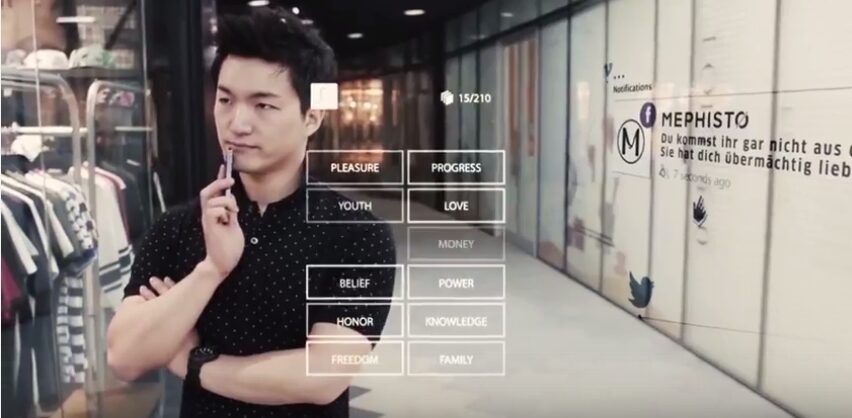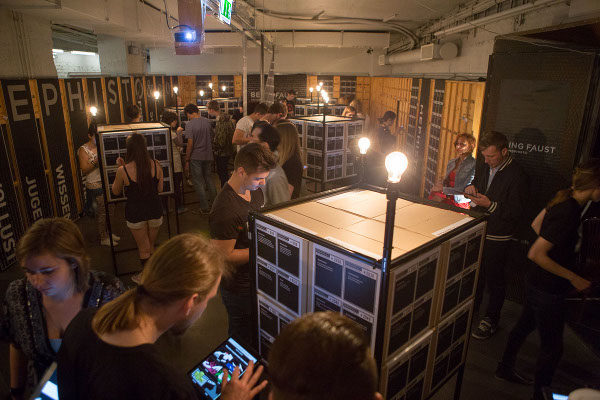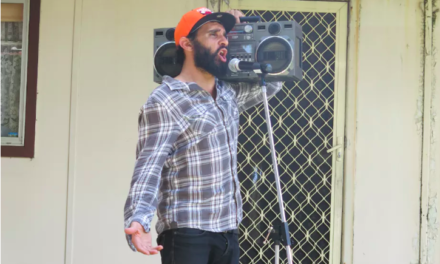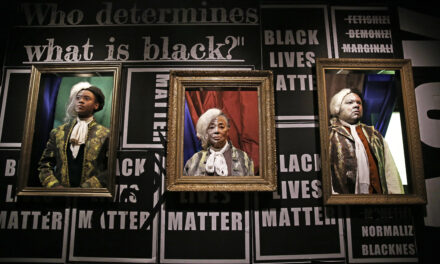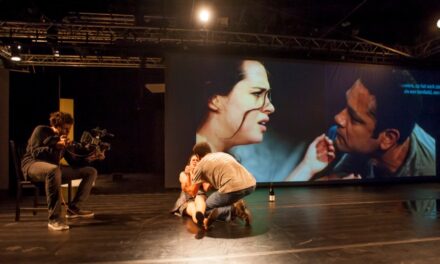Peter Lee is the founder of NOLGONG, the Seoul-based game design company, which is also producing offline games based on historical events and also on classical literature like Goethe’s Faust. Last spring they were also commissioned to design a game for the Korean presidential office, dealing with history. NOLGONG is also often approached by museums who have content and are looking for new ways to make it accessible to people, as they have lots of info to be enjoyed. We had a conversation about offline and online games, and about a possible future of the dramaturgy, or how to introduce a gamificative factor into dramaturgy.
You started your career at the Time Magazine. How was it back in the nineties?
My first job, as a web designer out of college, was at Time Magazine in 1995. That was the year when Time Magazine started Time.com, and they were looking for a new media designer, who would convert their publishing content into digital content. It was a different time back then; the internet era had begun, but web content was generated as if it were a print magazine: we had a weekly update, as Time Magazine was a weekly magazine. My main job was to make a fancy website of the print magazine covers whenever the new cover was released. I did that for two years; those were the “dot-com days”. But back then I wanted more interaction and I found video games very suitable for that. It was more like communication, a bi-directional medium because the game you create doesn’t end unless the player plays it. It was the form of media that I wanted to create: video games seem to be pure. I make games for the sake of the game itself, and the only reason for the existence of the game is to be played by players. In this very commercial industry it feels pure, in that what I create has a meaning for its own sake. This is also how I met Eric Zimmerman, who began as my teacher, and later became a fantastic friend and colleague. I also started my own company, GameLab.
You started your own company in 1999.
In 1999 there was a huge amount of money going around in order to create content for the Internet, but by 2000 all that money had dried up. We were slowly building up the company, and then in 2001, 9/11 happened. My office was 5-10 minutes away from WTC and after that morning we couldn’t get into our office for 6 months. So things hit us again. But in 2005 we launched the game Diner Dash; it was number one for almost two years in a casual gaming market. That made our company well known in the US. In 2007, me and my partner Zimmerman got interested not only in the commercial gaming industry, but we also started our own company because we did commercial work, but also a lot of nonprofit work for foundations and schools as well.
Can you give me an example?
We have worked with the MacArthur Foundation, and with the Gates Foundation. We have worked on lots of game-based learning programs and learning initiatives: we designed a game on poverty. We call these “serious games” nowadays. That led us to start a non-profit, called SidoPlay (today Institute of Play). Back then it was much more than an office – it was a lab. As we started in 2007, we were immediately asked by NYU City Education Department about opening a game-themed public school from 6th to 12th graders. It meant actually designing a school that was a game-themed one. It was up to us how we designed it, we were allowed to pitch the principle and the teachers about how they were going to teach but there ended up being textbooks anyway. The school opened in 2009 in the Chelsea area of New York City. It is called Quest to Learn and it was supported by MacArthur Foundation. It was amazing to be part of it and that experience inspired me to come back to South Korea. I wanted to change the education system in Korea. It was like “this is my mission”: I was dreaming to open a school that would change the system. I moved back in 2010, and quickly realized that one school is not going to change anything. Then I decided to have a wider approach. In order to change the education the culture has to change. So I decided to do something about the culture in general. It is probably a longer journey….
But you still want to open schools.
We are doing projects on education, but I try to be smart about it, so as to have the greatest impact, to spread it to as many people as we can. We are finding good partners, but it takes time, until the tipping point will happen.
This is why you started to work with classical literature?
Yes, when I moved back I started to look into things, I wanted to create an experience. I had a certain approach about how people can be engaged and be active to interact and to communicate with each other. In a broader sense, this is why I got interested in classical literature like Shakespeare, Goethe’s Faust, Tolstoy. Your whole life is in there, hundreds of stories and experiences that are still relevant. However, no one reads those books anymore. For me a video game is about your own experience, as a player, you have a choice, you decide. There are no right answers, and you are thinking about your choices based on the outcome. You are making choices, whatever the context and the situation is, you are not a stranger to it anymore. That is the beauty of the game. When people are playing Being Faust: Enter Mephisto, even if they never knew Faust, from that moment that the story isn’t foreign to them. Our goal is not to make people read it but to make them feel more comfortable with it, so they will have a relationship to the story. I think games are a fantastic way to build such relationships. But of course, two-three hours of gaming is not going to replace all literature. For example, for all the variety in classical literature, most people only remember one line from Hamlet: “To be or not to be.” It is a bit disappointing but this is the reality. This is when I realized, that creating our own game generation can be meaningful, because this is how people can remember literature. As we started from 1984, Romeo and Juliet, Anna Karenina, and then Goethe’s Faust, we were getting somewhere…
How are you calling these?
We just call it a big game. And we also call it an “immersive experience”. It is a game to me in a fundamental sense, it gives you a choice and as a player you choose. For most people, a game is a mobile game, or a video game, which limits itself. In Faust, it is sometimes like an immersive, interactive theatre experience.
So you call it theatre experience?
If I call it theatre, then the theatre critics come and evaluate it. If I call it exhibition, then the curators can’t really evaluate it. The game designer can hardly evaluate it. I would love to have a new name for it. We create an experience that hasn’t been named yet. You know when the cars came out they were named horseless carriage. For me what we do is a combination of a little bit of gaming, a little bit of a mobile experience; it is like an exhibition but also like theatre. As you are participating, it is also like a party. And these combinations create something new.
What do you think that performance art can learn from game design in 2016?
I think it will be very hard for theatre people to change their perspective. From a director’s or dramaturg’s point of view: they have a story, a drama to tell. They are delivering a story in the way they want to tell it. For me, there is a lot of experimental theatre, but what is “missing” is that the ending is determined. You could participate, but you don’t affect the ending as the audience. In gaming, the key is that you, as a participant, can decide the outcome. My point is that the choices you make help to determine the ending and this is the experience that you take away. That is the big difference and if theatre could accommodate that, it could be a challenging new development. Like when we were doing Enter Faust: Being Mephisto, we could bring in more of the performing arts, it could be more drama, but we could still design it so that the players can choose their own ending. For me sometimes experimental theatre is artistically amazing, but not approachable. Theatre peoples’ minds are totally focusing on the show, on creating the show. I could learn a lot from dramaturgical storytelling, but at the same time I can bring in aspects from gaming: what it is like for the player and how their experience effects the outcome. Theoretically, if there are 100 participants, they could all go home with their own experience. I think that is possible.
Do you intend to work more with actors?
In Being Faust…, there was space where we could bring in more actors, elements, and expertise from the performing arts, which can actually make an individual experience more dramatic. In Being Faust there’s more of a story, a premise, that’s like set direction. There is room for us to deliver the drama, but there is also a space for improvisation. The game elements are mechanic, but there are things that people decide on. We didn’t begin with a linear storyline. Instead, we looked first at points where people had to make choices. What would people do to satisfy their desires? Adding the storyline on top of this doesn’t break the core of the experience. If you start out with a linear story, anything you change will affect the story arch. But as we were considering where the user would have to make choices, we were thinking about what emotions the choices could inspire—this is very mechanical. We had room to add a linear narrative that won’t break our core structure.
This is how you design your literature games: don’t choose the story-path but the emotions in the choices the user makes?
Yes, we are focusing on emotions and ‘choice moments’ that represents the whole story. In Faust, it is about making a deal with the devil. In our game, there is a moment when you have to sell you friend. For me that was important, like: what do you want to sell in order to get what you want? Would you sell your mother to get the love of your life? The premise was, am I ready to sell my friend? The goal was about progress in modern, capitalist society. Progress drives you. It can be positive or negative, depending on what drives society. You wanted to be successful and famous. So you are sort of moving forward, for the sake of your loved one, for the sake of a family. Nothing is free in life, it is a deal with the devil. If you want something in whatever form, you are paying for it. It is about creating the moment when people realize what they actually use to pay. And the next moment, you are selling out your friend. That is a moment of choice. It’s not supposed to be too heavy and stressful, but somewhat uncomfortable. It is a game. It is not a Zen or Buddhist question. You have to choose to play the game or not. Even if it is fake, the whole act is a decision, like choosing, one side or the other. As a player, these are the choices you have to make, like it or not. To me, making these choices is what creates the emotional experience. Sometimes the question is chosen, but sometimes it is given by the situation. Those are the moments that we wanted to create and to provide. What we design is the structure of making choices. This way the content of the story goes into the experience.
You are always using new technologies when you are designing the games?
Yes, mainly because it makes these personal choice moments visible and clear. With smartphones, each player can have their own moments but within a feedback loop – that is very important. We use mobile devices to make that ‘choice moment’ clear. When it is finished, or while they are playing, it gives us insights into how people are doing and their choices in the moment. This becomes real time and it helps to improve the experience. To me digital technology lets you create the most analogous experience for a large crowd because using this technology, you can actually keep the experience going. It’s conceptual but it helps playing. It solves our issue by creating offline games played by hundreds of people before we couldn’t do it. For 1000 people you need 100 people to coordinate, we just need people to coordinate the game experience.
Are you still designing online or offline?
Nowadays we design games that are happening offline, like Faust and others, but I think some of our offline games can be more mobile, but we always start from offline experience. Because offline is where you live.
This interview was originally posted on Zip-Scene.com. Reposted with permission. Read the original article.
This post was written by the author in their personal capacity.The opinions expressed in this article are the author’s own and do not reflect the view of The Theatre Times, their staff or collaborators.
This post was written by Ágnes Bakk.
The views expressed here belong to the author and do not necessarily reflect our views and opinions.

